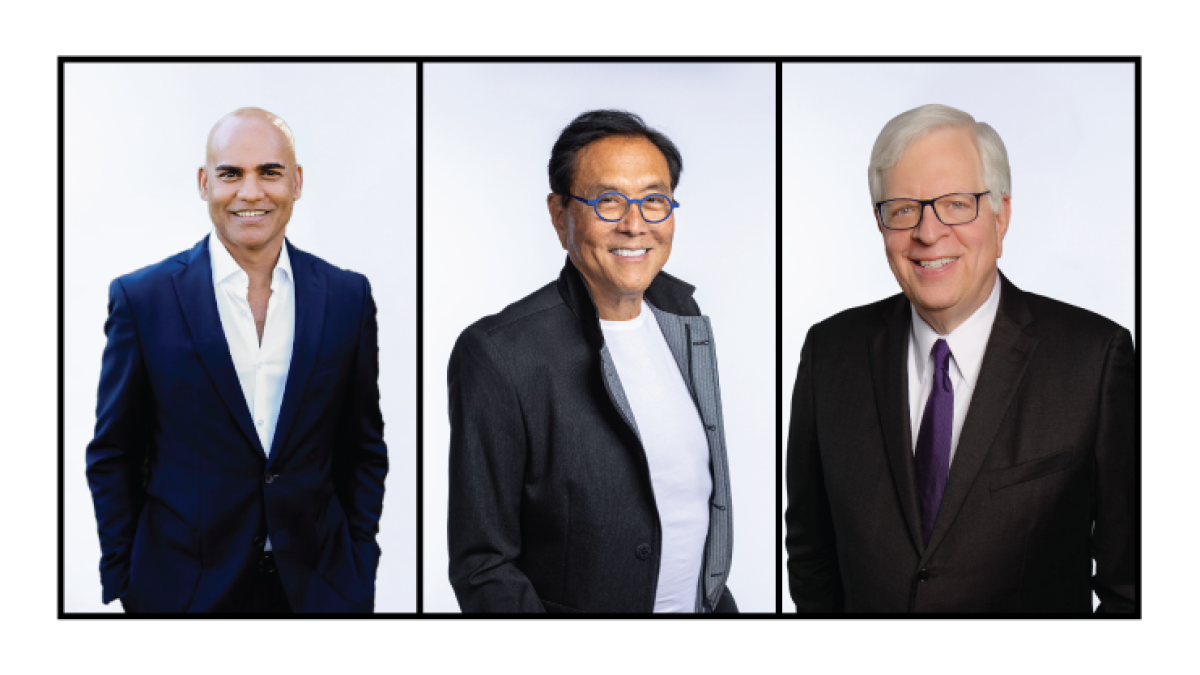Health, wealth and happiness focus of event presented by ASU on Feb. 8

From left to right: Dr. Radha Gopalan, Robert Kiyosaki and Dennis Prager will be the featured speakers at the Health, Wealth & Happiness event presented by the T.W. Lewis Center for Personal Development at ASU.
Health, wealth and happiness — perhaps three of the most sought-after yet elusive attributes of a satisfying life.
An upcoming program presented by the T.W. Lewis Center for Personal Development at Arizona State University will focus on these attributes and propose ways to achieve them.
"Health, Wealth & Happiness," featuring a panel including Dr. Radha Gopalan, Robert Kiyosaki and Dennis Prager, will take place from 7 to 9 p.m. on Wednesday, Feb. 8, at the ASU Gammage Auditorium, located at 1200 S. Forest Ave. in Tempe.
Gopalan, a board-certified heart transplant cardiologist and expert in Western and Eastern medicine whose approach to health and wellness centers care around one’s spirit and personality as opposed to a symptom-centered method, will share his perspective on health.
Kiyosaki, author of bestselling books (including New York Times No. 1 bestseller “Rich Dad Poor Dad"), entrepreneur, investor and educator who has challenged and changed the way millions of people around the world think about money, will speak about wealth.
Prager, host of a national radio show for the last 25 years, author of 10 bestselling books (including “Happiness is a Serious Problem”), host of the "Happiness Hour" weekly and founder of online Prager University, which has more than 5 billion views (mostly among young people) in 91 countries, will share his insights on happiness.
Both Gopalan and Kiyosaki are past Lewis Center speakers.
Tickets are free for university, college and high school students and may be obtained on the day of the event at the Gammage Box Office. Each student will receive one ticket when they present their student identification.
General admission tickets range from $20–50 and VIP tickets are $250, which include a reception with the speakers from 5:30 to 6:45 p.m. the day of the event on the promenade at Gammage Auditorium. Tickets are available online. In addition to the reception, VIP ticketholders get early access to the venue and parking, as well as front row seating. Proceeds from ticket sales will support the Lewis Center.
The Lewis Center, housed in Barrett, The Honors College at ASU, hosts over 30 speaker programs and 30 workshops per year, but until now they have only been available to Barrett Honors College students, said Ann Atkinson, Lewis Center executive director.
“This unprecedented event is a Lewis Center speaker program, but on a bigger stage so the public can benefit from the extraordinary combination of these thought-provoking speakers,” she said.
“This program will bring some of the nation’s thought leaders and subject matter experts together to discuss and dissect the important topics of health, wealth and happiness."
The Lewis Center was established in 2019 with the goal of preparing students for the challenges and opportunities of life. The center’s pillars are happiness and purpose, personal finance and entrepreneurship, and success and leadership.
To accomplish its objectives, the Lewis Center provides innovative courses, workshops and a speaker series focused on self-awareness (behaviors, values, strengths), personal values and character development, leadership and entrepreneurship, decision-making and risk-taking, career planning, success, and happiness. Many of the center’s speaker programs, workshops and honors courses address personal finance, happiness and wellness.
More Health and medicine

ASU grad dreams of helping hometown residents with a career in family medicine
Eliu Zaragoza When Eliu Zaragoza was in high school, he found himself especially drawn to his…

ASU grad finds purpose in serving her community through emergency medical services
Isabella Lirtzman Growing up in Scottsdale, Arizona, Isabella Lirtzman always knew she wanted…

What to know about Arizona’s measles outbreak
Arizona now has the second-largest outbreak of measles in the nation this year. Arizona State University’s Health…